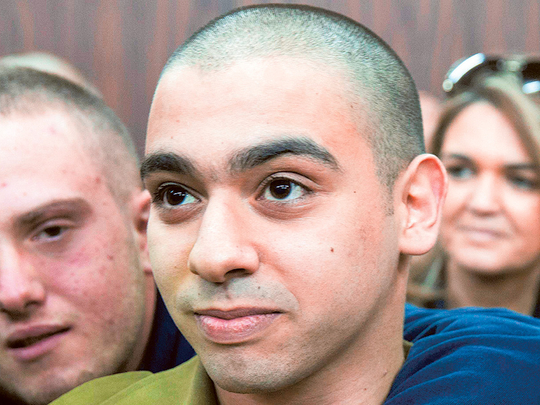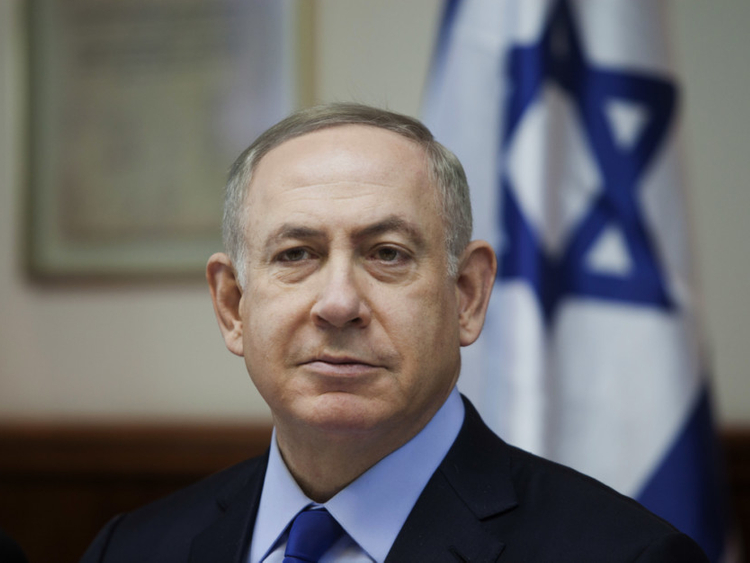
Tel Aviv: An Israeli occupation soldier who was convicted of manslaughter on Wednesday in the deadly shooting of a badly wounded Palestinian attacker, should be pardoned, Israeli Prime Minister Benjamin Netanyahu has said.
The verdict was an extremely rare case of an Israeli military court convicting a soldier for lethal action taken in the field.
Military commanders have condemned the soldier’s conduct while much of the public, along with leading members of the nationalist ruling coalition, have rallied behind him.
Sgt. Elor Azaria’s sentencing is believed to be weeks away.
Within minutes of the verdict, leading politicians were already calling for him to be pardoned. Under Israeli law, the country’s largely ceremonial president has the authority to issue a pardon.
Hours after the verdict, Netanyahu called for Azaria to be pardoned, plunging into the raging political debate that has divided the country and putting himself at odds with the military. On his Facebook page, Netanyahu wrote: “I support granting Elor Azaria a pardon.” He also urged the public to support the army and its commanders.
Azaria, an army medic, was caught on video in March fatally shooting the wounded Palestinian in the occupied West Bank city of Hebron. The Palestinian, Abdel Fattah Al Sharif, was lying on the ground and already unarmed when Azaria shot him in the head.
In delivering the verdict, which lasted nearly three hours, Colonel Maya Heller, head of a three-judge panel, rejected Azaria’s defence in painstaking detail.
She said there was no evidence to support his contradictory claims that the man was already dead or that he posed any threat at the time, telling him he “couldn’t have both sides of the stick.” She called his testimony “unreliable” and said he “needlessly” shot the assailant.
“We found there was no room to accept his arguments,” she said.
Azaria faces a maximum penalty of 20 years behind bars, though he is not expected to receive that much time. The military said he would be sentenced on January 15. The defence team said it would appeal.
The 20-year-old Azaria entered the court smiling and appearing confident, and he was embraced by a few dozen relatives and friends. But as the verdict was delivered, he stared gloomily ahead, and tensions quickly boiled over in the cramped, crowded courtroom.
Members of Azaria’s family clapped sarcastically as the decision was delivered, some screaming “Our hero!” A female relative was kicked out of the courtroom for screaming at the judges, and a second woman stormed out, shouting, “Disgusting leftists.”
The shooting occurred at the height of what has become more than a yearlong wave of Israeli-Palestinian violence.
Azaria’s defenders said he shot the Palestinian in self-defence, a claim typically made by the Israeli establishment.
But his detractors, including senior military commanders, have said his actions violated the army’s code of ethics and procedures.
Israeli rights groups have accused the army of failing to prosecute soldiers who commit unnecessary violence against Palestinians, and trying a soldier for a crime as serious as manslaughter is virtually unheard of. According to the army, the only manslaughter conviction “in recent years” came in 2004 over the fatal shooting of a pro-Palestinian British activist.
Gilad Grossman of Yesh Din, a rights group that monitors the Israeli military justice system, said the video of Azaria shooting the Palestinian gave the military no choice but to prosecute.













